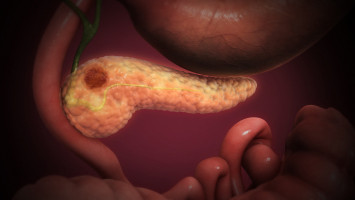
Researchers have discovered that a protein thought to only be involved in the development of neurons in the brain also plays a major role in the development and growth of pancreatic cancer.
Their findings demonstrate for the first time how the protein, called Netrin-G1, helps pancreatic cancer cells survive by protecting them from the immune system and supplying them with nutrients.
Pancreatic cancer is difficult to treat because tumours are often fibrotic, which means they develop extra connective tissue throughout the pancreas.
This connective tissue aids the growth of pancreatic cancer and provides a physical and biochemical protective barrier against drugs and the immune system.
This protective barrier is made up of a type of cell called a cancer-associated fibroblast (CAF), which interact with cancer cells to help them grow and survive.
Dr Edna Cukierman, Associate Professor at Fox Chase Cancer Center in Philadelphia and Co-Director of the Marvin and Concetta Greenberg Pancreatic Cancer Institute, who led the study, said: "Using a system we developed to study CAFs in a fibrous-like environment that mimics how they would behave inside the pancreas, we identified Netrin-G1 as being highly expressed in CAFs, and found that it supports the survival of pancreatic cancer cells.
We uncovered that Netrin-G1 allows CAFs to provide cancer cells with nutrition as well as secreting factors that inhibit anti-tumour immune cell function."
The study, published in Cancer Discovery and part-funded by UK charity Worldwide Cancer Research, also found that an antibody that neutralises Netrin-G1 was able to stunt the development of progression of pancreatic tumours in mice, demonstrating the potential of developing new treatments for pancreatic cancer that target Netrin-G1.
Dr Cukierman, said: "We saw that many patients express Netrin-G1 in CAFs and that these patients tend to survive for a shorter time so in the future detection of Netrin-G1 could be used to help diagnose patients.
We believe that limiting Netrin-G1 function provides the starting point for the design of new treatments in a type of cancer that is in dire need for effective therapies.
"We next plan to continue investigating the biology behind Netrin-G1 expression in CAFs, figure out a practical way to detect it in patients, and partner with industry to design Netrin-G1 blocking drugs.
This way we hope that targeting Netrin-G1 could serve, one day, to treat pancreatic cancer patients."
In the UK, over 10,000 people are diagnosed with pancreatic cancer each year and over 9,000 people lose their life to the disease.
Pancreatic cancer has one of the worst survival rates of any cancer with only around 1 in 20 people surviving for 10 years or more after their diagnosis.
Only 1 in 4 people diagnosed with pancreatic cancer in the UK will survive beyond one year.
Dr Helen Rippon, Chief Executive of Worldwide Cancer Research, said: "This is a fascinating new finding in cancer research which shows for the first time how a molecule thought to be involved in the brain is also able to help tumours grow in organs elsewhere in the body.
We're delighted to see such great progress from Dr Cukierman's project which offers a starting point for the future development of treatments against a particularly deadly type of cancer.
These positive findings come at a dark time for all of us and are a stark reminder of how dedicated our researchers are - working tirelessly towards new cancer cures even amid a global pandemic.
I'm sure this news will be welcomed by all of us who have had to experience the loss of a loved one to cancer."
Adam Coulson, a husband and father from East Lothian, Scotland, who lost both his parents to cancer, said: "My family and I were thrilled to hear of this breakthrough made thanks to research funded by Worldwide Cancer Research.
In November 2006 we lost my dad to pancreatic cancer.
I was only 22, Dad - just 54. When Dad died, Mum became two parents in one.
She really was the glue that held us together. Losing Dad was heart-breaking, but having Mum there kept everyone going - and everyone together. So, when Mum told us she had bowel cancer, our worlds fell apart. Again.
"Cancer has had a devastating effect on our lives. I think almost every single one of my family and friends has been affected in some way or another.
That's why we support Worldwide Cancer Research.
It was too late to save my mum and dad, but hopefully one day we can stop the suffering caused by cancer. And this breakthrough is taking us closer to that day."
Source: WORLDWIDE CANCER RESEARCH
The World Cancer Declaration recognises that to make major reductions in premature deaths, innovative education and training opportunities for healthcare workers in all disciplines of cancer control need to improve significantly.
ecancer plays a critical part in improving access to education for medical professionals.
Every day we help doctors, nurses, patients and their advocates to further their knowledge and improve the quality of care. Please make a donation to support our ongoing work.
Thank you for your support.